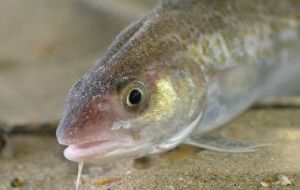MercoPress. South Atlantic News Agency
CO2 emissions are making oceans more acidic and threatening sea life
 The “Biological Impacts of Ocean Acidification” and part of the German-led Bioacid program, finds that juvenile sea creatures will be especially harmed.
The “Biological Impacts of Ocean Acidification” and part of the German-led Bioacid program, finds that juvenile sea creatures will be especially harmed.  This means, suggest the researchers, that the number of young cod growing to adulthood could fall to a quarter or even one-twelfth of today’s numbers.
This means, suggest the researchers, that the number of young cod growing to adulthood could fall to a quarter or even one-twelfth of today’s numbers. Carbon dioxide (CO2) emissions are making oceans more acidic and threatening all sea life, a new scientific report claims. The eight-year study, called the “Biological Impacts of Ocean Acidification” and part of the German-led Bioacid program, finds that juvenile sea creatures will be especially harmed.
This means, suggest the researchers, that the number of young cod growing to adulthood could fall to a quarter or even one-twelfth of today’s numbers.
The study incorporates the findings of more than 250 scientists. A brochure summarizing the main outcomes of the study will be presented to climate negotiators at their annual meeting next month in Bonn, Germany.
The report authors say some creatures may benefit directly from the chemical changes, but that even these could still be adversely affected indirectly by shifts in the food web. The research further shows that changes through acidification will be made worse by climate change, pollution, coastal development, overfishing, and agricultural fertilizers.
Since 2009, scientists working under the Bioacid program have studied how marine creatures are affected by acidification during different life stages; how these reactions reverberate through the marine food web; and whether the challenges can be mitigated by evolutionary adaptation.
Some research was conducted in the lab but other studies were conducted in the North Sea, the Baltic, the Arctic, and Papua New Guinea.
Ocean acidification is happening because as CO2 from fossil fuels dissolves in seawater, it produces carbonic acid and this lowers the pH of the water.




Top Comments
Disclaimer & comment rulesCommenting for this story is now closed.
If you have a Facebook account, become a fan and comment on our Facebook Page!